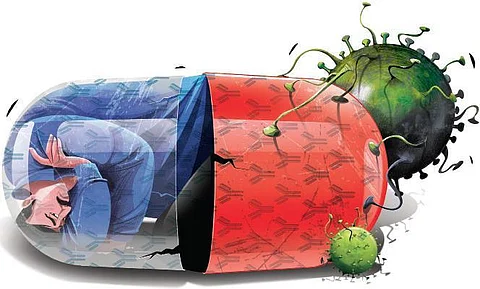

BHUBANESWAR: If you have tested positive for Covid-19 once, you need not worry about decline in antibody level. In a big relief for Covid recovered persons, a recent study by a group of scientists has found the antibodies against spike protein that give protection from the virus infection continued to persist and were constantly rising.
The study conducted on a group of healthcare and frontline workers by a team of researchers from Bhubaneswar-based Regional Medical Research Centre (RMRC), an ICMR research lab, revealed antibody level is declining against nucleocapsid protein, but not against the spike protein that gives protection from the infection. There are two types of antibodies that develop in a person post-Covid.
One is against nucleocapsid (N) protein and the second against the structural spike (S) protein that is the most important antibody as it gives immuno-protection and neutralises the action of the virus. The spike protein of coronavirus plays a crucial role in helping the virus invade host cells. Antibodies produced by the body’s immune system bind this protein and prevent the viral particle from infecting the host cell.
Scientist D and in-charge of Cobas Laboratory and antibody testing at RMRC, Dr Debdutta Bhattacharya said the study was conducted to get a better understanding of antibody levels as several private laboratories conducting antibody tests on persons recovered from Covid-19 claimed that their antibodies are decreasing leaving people worried.
A cohort of 76 Covid-19 positive healthcare and frontline workers, aged between 18 and 63 years, from Bhubaneswar was included in the study. They were enrolled after 28 days of being tested positive by RT-PCR and followed up for months. The team collected serum samples from these individuals for 16 weeks at weekly and fortnightly frequency during each follow-up and tested them for SARS-CoV-2 antibodies both qualitatively and quantitatively.
The researchers recorded the antibody level of the people 10 times highest between September 2020 and February 2021. Though a decline of antibodies against nucleocapsid antigen protein was noticed but not complete disappearance by the end of 16 weeks. “All 76 people were found to have higher antibody level against the S-protein. The antibody against N-protein is found waning in 30 persons with time but not completely disappearing.
Those found negative against N-protein might not be true antibody negative as those whose tested positive for antibodies against S-protein that would help in neutralising the virus,” he observed. The mean age of the participants, including 51 men and 25 women, was 36.5 years. Among the 76 participants, 60 were symptomatic during two weeks of the symptom onset.
Other members of the research team comprised Dr Debaprasad Parai, Dr Girish Dash, Usha Kiran Rout, Dr Hariram Choudhury and Rashmi Ranjan Nanda. The pre-print of the study titled ‘IgG antibody response against Nucleocapsid and Spike protein post SARS-CoV-2 infection’ has been published in Research Square and is under review by Journal of Infection.